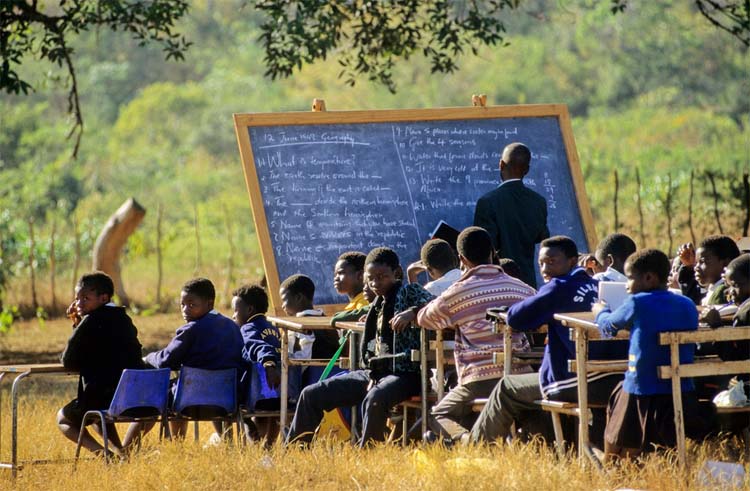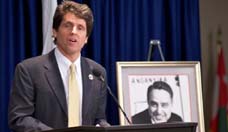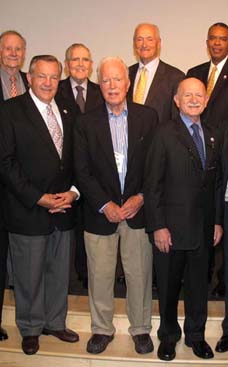2012.03.01: March 1, 2012: RPCVs comments on Ryan Cooper's article: The restoration of aggressive and regular oversight to all parts of the Peace Corps is the only thing that will bring the Corps up to a high standard
Peace Corps Online:
Directory:
South Africa:
Peace Corps South Africa :
Peace Corps South Africa: Newest Stories:
2012.03.01: March 1, 2012: Ryan Cooper writes: The restoration of aggressive and regular oversight to all parts of the Peace Corps is the only thing that will bring the Corps up to a high standard:
2012.03.01: March 1, 2012: RPCVs comments on Ryan Cooper's article: The restoration of aggressive and regular oversight to all parts of the Peace Corps is the only thing that will bring the Corps up to a high standard
RPCVs comments on Ryan Cooper's article: The restoration of aggressive and regular oversight to all parts of the Peace Corps is the only thing that will bring the Corps up to a high standard

Agree: K. Wilson writes: "I don't know whether what you describe in the article is really endemic, but it certainly reflects things I saw during my time in the Peace Corps (Costa Rica, late '70s). As long as things were going well, the agency was helpful, but its response to problems was often to either ignore them or blame the volunteer for complaining. Ironically, this caused far more trouble for those volunteers who took their work seriously. Many didn't, at least not after trying unsuccessfully to get problems straightened out. Costa Rica is a relatively wealthy and very pleasant country, and it was all too easy to kick back and head for the beach or the bar."
Disagree: Carrie Dawson writes: "I served as a Peace Corps education volunteer in South Africa just before Ryan. The problems he experienced with his schools (poor teaching, corporal punishment, etc) are endemic to the country and not just his site. The point is PCVs aren't sent to countries with happy, working education systems. We are sent to places that need help, which means having to deal with unusual and often very challenging situations. We aren't placed in frat houses, we are placed in rural housing situations where families deal with difficulties that might make them not so happy-go-lucky all the time. Ryan accepted such challenging possibilities by taking on his Peace Corps assignment. He should have read all about them when he prepared his application -- or did he really just join the Peace Corps simply to avoid joblessness or to put off paying student loans, as he alluded early in his article?"
RPCVs comments on Ryan Cooper's article: The restoration of aggressive and regular oversight to all parts of the Peace Corps is the only thing that will bring the Corps up to a high standard
Comments
Post a comment
Texas Aggie on March 06, 2012 9:04 AM:
As a former PCV, I had a pretty good experience, but since then, I've heard of a lot of cases where things have not gone well. The disappearance of a volunteer in Bolivia is just one where PC did little or nothing to find out what had happened.
Equal Opportunity Cynic on March 06, 2012 9:16 AM:
Ironically, that sainted reputation may lie at the root of the kinds of failures that 20/20 calls out-namely, the agency's propensity to be evasive, opaque, or even callous when things go wrong.
This reminds me of four words: Catholic Church. Penn State.
K Wilson on March 06, 2012 10:53 AM:
I don't know whether what you describe in the article is really endemic, but it certainly reflects things I saw during my time in the Peace Corps (Costa Rica, late '70s). As long as things were going well, the agency was helpful, but its response to problems was often to either ignore them or blame the volunteer for complaining. Ironically, this caused far more trouble for those volunteers who took their work seriously. Many didn't, at least not after trying unsuccessfully to get problems straightened out. Costa Rica is a relatively wealthy and very pleasant country, and it was all too easy to kick back and head for the beach or the bar.
Normally things go pretty well, and in general the Peace Corps does good work, but I think you make some excellent points.
Wally on March 06, 2012 6:01 PM:
We had some of these whiners in the Peace Corps in Central America in the 80s. Usually, they spared us the whining and "ETed" (short for early termination and departure). Sure we shared complaints but soon most PCVs toughen their hides.
But sometimes, some publication will give the whiners a forum to resurrect the same old tired complaints about:
1) inadequate training;
2) inadequate financial and personal support; and
3) non responsive or inefficient bureaucatic processes.
Kind of Army FUBAR on steroids. The vast majority of Peace Corps Volunteers - who stick it out - acknowledge these problems but knew - GOING IN - that this was what they signed up for. This aint't the World Bank with expense accounts for gold plated projects. It is a challenging learning experience, a cross cultural experience and a lesson in becoming a self starter. Lessons that prepare RPCVs to contribute to and often lead domestic and international organizations in later careers.
But whenever there is a murder or rape, these whiners come out of the woods again. Mind you, not vigorously investigating and pursuing perpetrators of violent crimes against Peace Corps Volunteers is outrageous and the Peace Corps Country Directors responsible should be fired and possibly prosecuted. But those crimes are NOT related to the author's bitch session.
Sorry Ryan, my assigned counterpart stole from me, challenged me to fisticuffs and claimed I impregnated a neighbor. The government agency I was with had no financial resources, so I raised some money on my own. A former military police neighbor falsely accused me of beating his kid and his ex cronies imprisoned me in a dark hole for two days. And you know what, so what? This is what Peace Corps Volunteers routinely encounter and it makes us tough.
When I got out of the Peace Corps, I helped indigenous people on two continents fend off illegal loggers and I was a key negotiator pushing the World Bank to establish their first mandatory environmental and public participation procedures. And those things are just run of the mill for many RPCVs who go on to change the world BECAUSE of their difficult Peace Corps experiences.
And Ryan? He is still complaining about his site.
Me? Toughest job I ever loved.
Wally on March 06, 2012 6:13 PM:
And for you Equal Opportunity Critic, well, I think Rush Limbaugh compares favorably to you. At least he took the trouble to try to connect the person to the vicious slander. You make no such effort in your connection of those protecting child rapists to anybody or anything in the Peace Corps.
First, the Peace Corps had nothing to do with the accused rapist and has no role in investigating host country crime - this complaint needed to go through host country law enforcement channels. Second, the PCV herself and Peace Corps staff mishandled her complaint by not making sure it was kept confidential. But most PCVs would know not to trust something so sensitive to host country staff in a clannish society. For example, do the same thing in Alabama and let's see what happens.
But these tragic missteps have NOTHING to do with the Catholic church protecting child molesters. Now go back to listening to Rush.
Carrie Dawson on March 06, 2012 6:36 PM:
I served as a Peace Corps education volunteer in South Africa just before Ryan. The problems he experienced with his schools (poor teaching, corporal punishment, etc) are endemic to the country and not just his site.
The point is PCVs aren't sent to countries with happy, working education systems. We are sent to places that need help, which means having to deal with unusual and often very challenging situations. We aren't placed in frat houses, we are placed in rural housing situations where families deal with difficulties that might make them not so happy-go-lucky all the time.
Ryan accepted such challenging possibilities by taking on his Peace Corps assignment. He should have read all about them when he prepared his application -- or did he really just join the Peace Corps simply to avoid joblessness or to put off paying student loans, as he alluded early in his article?
Ryan should not have expected his supervisor to read his mind when he said no to a change in living situation ("but I really meant 'yes'"). He should have tried to find more creative solutions to helping students at the school instead of simply giving up and spending more time at other PCV sites. What about after school clubs? Tutoring? Did he try alternative behavior modification efforts to deal with misbehaving students who knew you didn't use corporal punishment?
Although he claims to have wanted to "give back" to PC by participating in a volunteer training, it seems that Ryan was a bit more self serving. Why not try a more effective method of creating change instead of writing a nasty blog post? What good did that do?
Sadly, this story just highlights what I consider to the biggest problem in Peace Corps: many of the volunteers are young college graduates who are working a real job for the first time in their lives and because they have been coddled at elite private schools by helicopter parents for 23 years, they do not have the strength for the challenge. Instead of working through it and actually learning and growing from the experience and accepting some of the blame, they just complain.
Kristin on March 06, 2012 7:16 PM:
I think readers are missing a huge point here. Set aside all of Ryan's personal issues he had in his site and what he could have/should have done, Peace Corps did not hold up its end of the deal in finding him a safe, productive site that would actually benefit from a PCV. That should be 100% the first priority of the Peace Corps, the entire program is useless without that first, most simple, step. And speaking from experience (I was in Ryan's group and was his closest neighbor), the PC staff was stretched so thin (limited staff and budget for the # of volunteers) that it was unable to put in the proper amount of work to prepare a host site, as well as properly supporting the volunteer once they were there.
Of course there are the unprepared volunteers who just complain the whole time (and for the record, Ryan was not one of these, but one of the only ones who sucked it up and dealt with what he was given however he could). I wholly disagree that this is because too many PCVs are recent grads just trying to evade the rough job market. While many of us were fresh out of college, I would say (again from experience based on my group) some of the volunteers who struggled the most in our group were the older, sometimes even retired, PCVs who had too high of expectations for how they were going to make a difference based on their years of experience in the field (which almost never mattered). Of course there were issues with some of the "gen Y" recent grads, but I would say on a whole, the younger volunteers are able to very quickly adapt to their situations and are exceptionally eager.
In any case, I believe the point of the article is that PC isn't taking a look at how it can really solve problems and improve its programming, and that there is a huge disconnect between the mission of the org and what is actually happening on the ground. I wholeheartedly agree that PC needs to take major steps to improve the quality of service across the board, as opposed to increasing the number of PCVs.
Sarah Mattingly on March 06, 2012 7:46 PM:
I was a volunteer in South Africa from 2006-08. I was 64 when I went, hardly a fresh, wet-behind-the-ears graduate of an elite private school with helicopter parents. How snide! My experience, though with NGO's, not the pitiful education system, was much like Ryan's. I had to go to Botswana to purchase Setswana language materials as we had been given NONE; rather we had a series of three instructors during our training, each with her own unique way of utilizing an easel and paper pad. As an older volunteer, learning Setswana was extremely difficult for me, especially with the dismal state of the training. And then I was sent to an urban area where most everyone spoke English and I had little to no opportunity to use Setswana on an ongoing basis. I mention this only because my lack of language skills became an issue later.
But, still, for nearly two years I lived in my little bubble, ignoring or forgiving Peace Corps and offering emotional support to as many volunteers as I could. I overlooked all the shortcomings of my site and really loved being there. However, when a difficulty arose with my NGO's manager, I was verbally attacked by my APCDs for my "American" ways and lack of language skills and left a month later, having fulfilled my commitment, bitter and angry. I am disappointed and angry to this day when I think about my experience.
I went with a full arsenal of skills, which would clearly have been best utilized in a new, developing NGO. This I made clear in all my writing and interviews. I was sent to a international NGO and had nothing to do but data entry. It got worse, but that tells enough about my experience for you to get the idea. Everything about Peace Corps South Africa was a mess, in my experience. Most volunteers with whom I've spoken agree that we shouldn't even BE in South Africa.
I met, worked with and maintain friendships with several South Africans, who call me Soul Mom. The South Africans weren't, with notable exceptions, the problem. The problem for me was the total lack of support from the Peace Corps, itself.
Ryan, I wish I'd known you in South Africa. Your experience mirrors that of most of the volunteers I knew there. Great article and it moved me to my first writing about my experience.
Karen Kaye on March 06, 2012 10:00 PM:
What Sarah said! And count me in total agreement with "everything in Peace Corps South Africa was a mess" and as one of "the volunteers that agree we shouldn't even BE in South Africa." Wally and Carrie?? Eish!
Ryan, carry on!
Zinto on March 07, 2012 1:10 AM:
As a South African RPCV in the same time frame as Ryan, I would disagree with the above sentiments that PC should not even be in South Africa. South Africa has one of the highest HIV rates on the planet coupled with one of the most dysfunctional education systems - there are tons of opportunities to properly utilize a volunteer's skills (weather it be Americans or South African's themselves which is a whole different discussion). The difficulty arises in what Ryan (and so many PCV experience) - that much of training and placement feels random; some get amazing opportunities while others are assigned placements which are stacked against them solely because Peace Corps staff did not/could not/would not spend the time to prepare and place volunteers or address serious issues.
I absolutely loved my time in Peace Corps and I loved living and working along side my neighbors. Yes it was hard, damn hard, yes it was a sink or swim trial by fire. Most of my frustration however came from Peace Corps itself and I wish I learned faster what outgoing PCVs told me when I was new: 'Don't let Peace Corps ruin your Peace Corps'. Efforts to improve training/placement/addressing issues by PCVs were so often doomed to failure from the start due to apathy on staff's part that many learn simply to smile and nod, then promptly ignore Peace Corps as much as possible and do the best one can without the guidance.
Look at all you accomplished and learned, and then imagine what could have been with even only marginally better preparation/oversight. Heck one might even learn to become 'hard' without being kidnapped for two days in Central America! A race to the bottom with PCVs experiences is counterproductive - we all have our horror stories but our host countries are better served by reducing them.
PQuincy on March 07, 2012 9:03 AM:
Great parody, there, from Wally! I bet he used to walk 18 miles in the snow to kindergarten, too!
The author may be whiny, but that does not make the underlying point less valid: _particularly_ when dealing with institutionally erratic situations, good management (not heroic toughness) are exactly the quality the PC should insist on. What exactly is there to defend about a PC language-training program in which the assessment process was faked -- not to benefit the trainees, but to protect the _trainers_, who were PC employees?
RPCV on March 07, 2012 1:32 PM:
I had an excellent service, with little to no thanks to my country office. My initial site placement involved an apartment that was shared by a total stranger, with half of it filled with the landlord's belongings, in a town 30 min away from my actual site. That took 3 months to resolve. My roommate was assaulted and nothing was done until the US ambassador intervened. Many other volunteers had issues ranging from attempted sexual assault to ineffective counterparts. Most things weren't so bad that none of us couldn't tough it out, but everything could have been prevented. Cooper is right - most country offices can skate by with the bare minimum.
I loved my service and continue to recommend it to others, but there is so much to be done.
K Wilson on March 07, 2012 5:28 PM:
"We had some of these whiners in the Peace Corps in Central America in the 80s . . "
Yes, we did too; whiners are always with us. We also had our share of macho types who thought pointing out a real problem with the system and trying to correct it was "whining", and that the way to deal with any problem was to sit down, shut up, and "toughen your hide". I sometimes wondered why they didn't just go join the Marines, which seemed more their style.
Some systemic problems are real, some criticisms are legitimate, and tying to improve the system so that volunteers can do their jobs better is not always "whining".
Cheryl Frances on March 07, 2012 8:33 PM:
As RPCVs, my husband & I concur with Mr. Cooper's viewpoint and applaud his decision to go public with his concerns. We too experienced similar situations during our service (2007-09); and, for those who may categorize us, along with Mr. Cooper, as "whiners", please see peacecorpsonline.org/messages/documents/ludlamhirs choffplan.doc for volunteer affidavits 28 different countries. The movement to reform Peace Corps is based on a desire to create an agency that lives up to its goals, properly cares for the well-being of volunteers, and uses citizens' tax dollars wisely.
Mellie on March 08, 2012 12:59 PM:
Wait, so your supervisor said you could switch sites and you said no. How is this Peace Corps' fault?
The school was fraught with problems? You wanted to do Peace Corps in an easy setting?
Wally on March 08, 2012 7:34 PM:
"The problem for me was the total lack of support from the Peace Corps, itself."
This quote sums up what Ryan and his buddies here are saying. And guess what? It's. Called. Complaining. You people are complaining about an institutional characteristic that is intrinsic and well known - what was so different about a small group of you who had high expectations for support from the 10s of THOUSANDS of us who had low and accurate expectations of support?
@PQ - Nice try to twist my post to claim that I, like Ryan, was whining about my experience. Read my post again. You conveniently skipped the part where I said that these challenging things happened to me but; "And you know what, so what?"
@ KWilson. That is the funny part about making claims about people you don't know - you might disprove your own point. During my service in Peace Corps, another volunteer and I introduced an environmental impact assessment (EIA) system so that PCV projects (e.g. construction projects like bridges) didn't unintentionally harm the local environment. After Close of Service , I was in D.C. and instead of public teeth gnashing in a column, I worked with PC to integrate this EIA process into all PC training.
So read my post again: it said nothing about not doing anything about REAL problems; it said that this lack of support scenario is well know and vital part of the Peace Corps experience. Those who deal with the challenges in PC and learn from them actually go on to fix more important REAL WORLD problems.
Bad trainers can be a problem but perhaps, in you people's case, the problem was bad recruiters.
Wally on March 08, 2012 7:43 PM:
Oh, and Washington Monthly? Thanks for the insipid and banal image of a Peace Corps volunteer with the guitar and smiley face.
This may be a generational humor thing, but in my view it is stereotyping Peace Corps volunteers as naive do- gooders. While I may not agree with Ryan and his two friends here, my guess is they, like other PCVs who stuck it out, were not naive do-gooders.
wanda wood on March 08, 2012 10:42 PM:
I so agree with this article, I feel I could have written it myself. I served as an older volunteer in South Africa between 2007-2009 and found most of the same things. I saw rapes being hushed up, volunteers being mugged regularly, and sites were so badly assigned and followed up on that it was literally as if there was no support and no concern once you were there. All in all I served about 4 years with PC, but feel totally jaded by them at this point. In no location did I find the supervision team involved, nor did I find them responsive to particular need. It was always the volunteer who was at fault.
Sa24er on March 09, 2012 3:11 PM:
I'm a current education volunteer in South Africa in the same region as Ryan. My experience so far has been fairly rewarding, I'm teaching English at a primary school and am working with kids after school.
Pre service training covered a lot, my language teacher did her best to teach me Setswana and I passed the language proficiency interview as advanced. It's my job to continue working on learning the language. Any time we had a suggestion for improvement during our training, we saw changes almost immediately. Sa26 will be receiving much more thorough training in teaching English as a Second Language.
The safety and security officer here is amazing, he responds quickly and is proactive in warning us about potential pitfalls and dangers. As for site placement, sometimes sites do not work out, it's the responsibility of the pcv to let the apcd know when things aren't working out. There have been a few volunteers in our group who have had to change sites for one reason or another but they're genuinely happy about where they are and the work that they are doing. One major lesson we learned during training is that the quality of our peace corps experience, depends on what we choose to do. It has a lot to do with attitude and being proactive.
One major improvement since Ryan's group cosed is that we have a wonderful Peace Corps Volunteer Leader who has been supporting us as we are adjusting to teaching in the South African education system.
There are still improvements that can be made in the Peace Corps agency but its important to remember that it is run by people and that they genuinely are doing the best they can with the resources they have. Much the same way volunteers have to work with what they have. If you're trying to improve the Peace Corps, as a current volunteer, thank you. But just so you know, change takes time and our current group is benefitting from the lessons learned during your time as a pcv.
K Wilson on March 09, 2012 3:32 PM:
@wally - " . . . it said nothing about not doing anything about REAL problems; it said that this lack of support scenario is well known and vital part of the Peace Corps experience."
And right here you demonstrate my point. Yes, lack of support is a well-known condition. It is, however, no less of a problem for being well-known. In many cases it prevents volunteers from being as effective as they might otherwise be. Most volunteers manage to do good work nonetheless, but pointing out that the problem exists is not "whining".
Claiming that an organizational problem which makes PCVs less effective is a "vital part of the Peace Corps experience" is nonsense. It's not. It's just a screwup, poorly done work, and helps no one. This is exactly the sort of macho posturing of which I was speaking.
Wally on March 12, 2012 6:27 PM:
@K Wilson.
You don't seem to get it what almost all PCVs understand; you were NOT a development professional. You were NOT someone who was paid as any kind of professional, like World Bank, AID, CARE or the WHO would pay real professionals in the field.
No, you, like all PCVs, were VOLUNTEERS. Get it? Volunteers. AKA rookies, non-professionals. And thus, your claims of having some kind of potential to be "effective" as a PCV are just fantasy. If, IF you were effective in Peace Corps, it was because you showed a outstanding entreprenurial and organizational skills. But like most PCVs, you didn't. And that is how Peace Corps operates.
But unlike me and the vast majority of PCVs, your small group of complaining South Africa RPCVs didn't seem to understand that you were getting something: real world subsidized opportunities to learn entreprenurial, language and organizational skills. And why did you get this government subsidized training in international development skills? Because you DIDN'T have them when you went in. It appears that you still don't.
But this thread has stimulated me to action. I am going to urge PC that they close the South Africa Peace Corps mission. Not because SA does not need help but because it seems to get nothing but PCVs who feel entitled to be treated as professionals, even though they are not.
Rob on March 13, 2012 1:52 AM:
Wally, quit digging.
In my group of twenty PCT's the average age was 46, and nearly every person had at least one master's degree or a PhD. We got sworn in as PCV's, aka VOLUNTEERS, which doesn't mean rookies or non-professionals.
Cut the bluster, Wally. You're talking smack, insulting others, and trying to portray yourself as a hard-ass and top performer. Instead, you come across as a jerk, who is fear-biting constructive contributors.
Ryan: the budget issue you mentioned in passing may very well be a root cause of many of the problems you describe: when the county's budget get's zeroed-out, the staff cannot travel. Visiting the northernmost PCV and southernmost PCV in Costa Rica can easily be done in a day. Not so in many countries, where it is a full-day's drive to get to a single site. And barring a direct emergency, that travel gets cancelled when there's budget stress, (at least it did where I served).
I've heard that in some countries the local government demands PC staff their offices with friends of the administration in power. These are the worst staffs in the world. My personal choice would be that PC close the post rather than support such corruption, but we all know that the real damage will be to those who could have received life-changing influence by a PCV, and didn't. That's not fair. Even unhappy PCV's can change people's lives in profound positive ways.
Wally on March 13, 2012 9:23 PM:
@Rob. And good morning to you, my fellow RPCV. Now, I don't recall spieling such bluster as you accuse me of, claiming oh, for example that K Wilson or Ryan "talked smack" or "insulted" people or made "fear biting" comments (whatever that is...) Yet according to you, it is I who am a "jerk." Interesting projection Rob.
And your post AGAIN proves my point. Let's compare my post to yours. Me - I was not a development professional and had no experience in international development (despite a graduate degree) and I said I got no support. For me, though, like most PCVs, the lack of support not only didn't cause me to complain years later but it helped me become a tougher person.
You - You also were not a development professional and had no experience in international development but BECAUSE you had a graduate degree from an AMERICAN university in well, something, you believed you had some kind of status in the third world and should be given some kind of financial or human resources support.
So, there it is. You had no reason to feel entitled but like Ryan, you did feel entitled. And when someone like me points out that most RPCVs understood the lack of support and that only the minority, like you, that have a displaced sense of entitlement, you respond with vitriolic insults to another RPCV, me.
My comments stand. While I think Ryan was well intentioned, I don't think people like Ryan or you made good volunteers. I didn't think it then and you are confirming why. You felt entitled and needed to blame someone for not getting some kind of accomplishment or affirmation of your value when in the Peace Corps. That is not what Peace Corps is about. Sorry you missed the point.
Anonymous on March 13, 2012 9:26 PM:
@ Rob.
In regard to your attempt to critique the entire management and staff of the Peace Corps, you say, "I've heard that in some countries PC staffs its offices with friends..."
Wait, you "heard" that? So you heard some nonsense and write an entire post slandering all of Peace Corps ("corruption")? Why is what you say nonsense? Because PC eliminated politically appointed Country Directors THIRTY years ago. Every company hires people based on personal connections.
Weird post.
Links to Related Topics (Tags):
Headlines: March, 2012; Peace Corps South Africa; Directory of South Africa RPCVs; Messages and Announcements for South Africa RPCVs; Training; Criticism
When this story was posted in March 2012, this was on the front page of PCOL:
Peace Corps Online The Independent News Forum serving Returned Peace Corps Volunteers 








 | Mark Shriver Speaks Truth to Power
Sargent Shriver spoke truth to power to Presidents Kennedy and Johnson and to every leader he met. "He would know that during the 2008 election, President Obama campaigned on doubling the size of the Peace Corps. That is not even close to happening - indeed, there is a long waiting list of 20 new countries requesting Peace Corps programs. Do we really mean to have peace? If so, why isn't it beginning here, in the United States? Or are we just supporting the rhetoric and spending the money elsewhere?" |
 | Peace Corps: The Next Fifty Years
As we move into the Peace Corps' second fifty years, what single improvement would most benefit the mission of the Peace Corps? Read our op-ed about the creation of a private charitable non-profit corporation, independent of the US government, whose focus would be to provide support and funding for third goal activities. Returned Volunteers need President Obama to support the enabling legislation, already written and vetted, to create the Peace Corps Foundation. RPCVs will do the rest. |
Read the stories and leave your comments.

Some postings on Peace Corps Online are provided to the individual members of this group without permission of the copyright owner for the non-profit purposes of criticism, comment, education, scholarship, and research under the "Fair Use" provisions of U.S. Government copyright laws and they may not be distributed further without permission of the copyright owner. Peace Corps Online does not vouch for the accuracy of the content of the postings, which is the sole responsibility of the copyright holder.
Story Source: Washington Monthly
This story has been posted in the following forums: : Headlines; COS - South Africa; Training; Evaluation; Criticism
PCOL47662
54

















